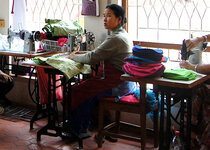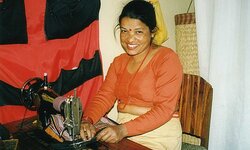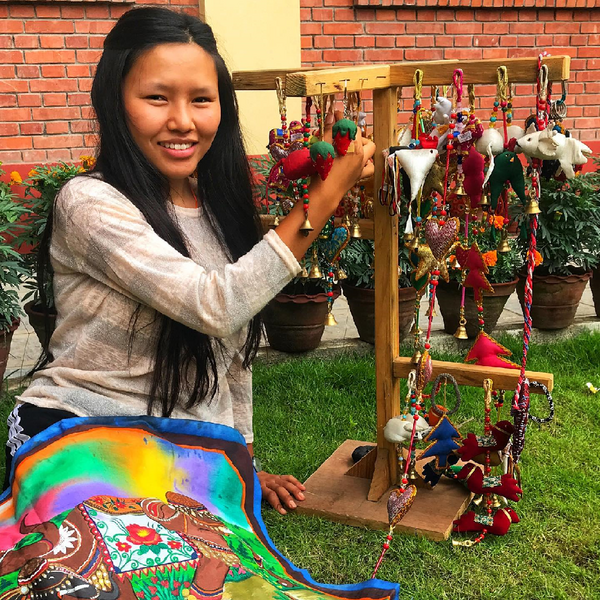ROKPA Women's Workshop: Steps Towards a Self-Reliant Future
The social position of Nepalese women coming from the lowest stratas of society is marked by dependency and influences the lives of their children. The women are generally married very early. They very often have several children at an early age. In turn, these kids do not have any education prospects.
With the growing number of children, many women are often abandoned by their husbands. Without an education they have little opportunity to earn a living for themselves and their children. This is why they often end up on the streets to beg or take on to very poorly paid jobs where they are exploited and have hardly any time to look after their children.
In order to enable impoverished women and their children to have a better opportunity in the future, ROKPA Women’s Workshop offers women a safe and secure environment to work and earn an income. A fair salary saves them from a life on the streets and enables their children to go to school.
Meet here some of the women working at the ROKPA Women’s Workshop.
Life stories
-
Lhamu Sherpa

"I was trained as a seamstress as part of the women's workshop, and am now able to provide for myself. I am extremely thankful to ROKPA for this opportunity — I could never have freed myself and my children from a life of misery on my own.
Our family was very poor, there was never enough to eat, and no clothing. My parents thought it unnecessary to send me to school. A marriage was arranged for me very early on. It was a good marriage, and I was very happy. When my baby was two months old, my husband suddenly died. My parents-in-law held me responsible for the death of their son, and drove me and my daughter out.
The only thing I knew how to do back then was knotting carpets, so I traveled to Kathmandu. I took my daughter with me to work. She spent the entire day in a dark, dusty room. Because life is especially difficult for a single mother in our society, I saw no other choice but to accept a marriage proposal from a work colleague. Over the next three years, I bore three daughters. However, my husband did not provide for us, and when he took another wife, I left him. I once again started knotting carpets, but did not know what to do about my children. My elder sister had heard about ROKPA, and said that I should ask them for help.
Now my children are going to school. ROKPA pays their school fees. As for me, I work in the ROKPA women's workshop. Bit by bit, I am starting to forget the bad memories of my former life." -
Radhika

"I was born a deaf-mute at the edge of the Kathmandu Valley. My family lived in a traditional mud-walled house. We were very poor. My father was a tailor — when I was eight he brought me to his shop and taught me his trade. He taught me the only trade I know. Nobody in our village had enough money to send the children to school.
My mother died when I was ten years old. My father married another woman before my mother died. That was when everything changed: From then on, I had to work in the house, but my stepmother was never satisfied. She was always scolding me, hitting me, and saying that I might as well leave the house because I was useless. I saw a chance to escape when an early marriage was arranged for me. I was twelve years old, and my husband about fifteen. I had no idea what was going on. My first daughter was born when I was fifteen. I bore my husband four children, but was treated very badly. It was better for me to live alone than with a brutal, violent man.
After the divorce, I went to beg in Kathmandu without being able to speak to people — I often felt very lonely because of that. One day I plucked up the courage to go to the ROKPA soup kitchen. I had heard that Mummy Lea (Lea Wyler, vice president of ROKPA) helped people like me. I took my oldest daughter with me to be able to speak with Mummy Lea. She was taken in by the ROKPA children's home, where she is learning a trade. After that, I was given a job in the women's workshop, and was able to use the skills that my father had taught me.
Finally, I was no longer alone - my colleagues became my friends. They found a way to communicate with me. They call me the "Master Seamstress", because - thanks to my father's strict way of teaching - I am able to do what I do extremely well, and am therefore a good and experienced worker. I am proud and happy and have finally found joy in life, even though I have a major disability."
(Radika communicates through her daughter Anju or through a friend who understands her sign language)

Receive from our ladies beautifully handcrafted items and the added bonus of supporting a charity with the highest standards of excellence since 1980.